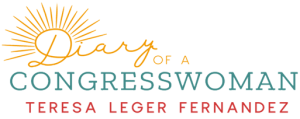Mary-Charlotte Domandi:
So the core of pretty much any democracy is voting, and in the US the right to vote has not been there for a lot of citizens over the course of our history—and even while voting has expanded from white male landowners to virtually all citizens—with some exceptions, like people in prison and some ex-felons—even people who have the right to vote are still struggling to exercise that right. As of today, over 250 laws have been proposed in 43 states, in state legislatures, to limit voting. I asked Teresa, what are the common themes in these proposed laws, what do they say, how would they limit voting, and for whom.
Teresa Leger Fernandez:
The common theme is that it’s to restrict access to, primarily, those communities that have a harder time voting or that don’t have some of the requirements. So they’re very targeted at communities of color, at poorer sections, but the way they go about it is different. They might do it by restricting the days that early voting is available. You know, one of the more talked about efforts is the fact that there is voting on Sundays so that you go from church to the ballot.
MCD:
“Souls to the polls.”
TLF:
Souls to the polls. Or just more days of early voting, because we know that for a lot of people who work voting on a Tuesday might not work for you. Or if you work five, six days a week, juggling two jobs, whatever it might be, more early voting means more people vote. They might be restricting the idea that you might rely on a neighbor or an organization to get your ballot to the polls, after you fill in an absentee ballot, that you’re going to rely on that. The variety of ways in which they’re targeting our communities shifts. The common element is they don’t want us to vote. And what it should be is democracy is about everybody voting! But there is a recognition by Republicans—we had the highest turnout and they lost. So instead of saying, we’re going to come up with ideas that will win people over, instead of that we’re going to make sure that people can’t vote. That’s nothing new. They’ve been restricting voter access for decades and centuries. And this is just the latest iteration.
MCD:
We’ve talked about HR1, which has been passed more than once through the House of Representatives. It’s a voting rights bill that has passed again recently. It’s going to have a hard time in the Senate because of the filibuster, even though 70% of Americans, including 57% of Republicans, are in favor of it, according to the last poll I saw, which was a couple of days ago. And yet Republicans in Congress are calling it, and Mike Pence and others are calling it, “unconstitutional.” Why are they saying this? Is there any validity to it at all?, And how do you make sure when writing a bill like this, I mean, you’re an attorney and reviewing a bill like this, that it’s not vulnerable to constitutional challenges, that it is in fact constitutional.
TLF:
So they’re calling it unconstitutional because they’re hypocritical. On January 6th, they were standing up and they were saying, We want to overturn the results in Philadelphia. We want to overturn the results in Arizona. We want to overturn the results in Georgia. So they wanted to overturn states’ decisions about the election. And now they’re saying, Oh, the federal government cannot tell the states what to do with regards to voting. And that is simply not true. The Voting Rights Act and many other acts are intended to protect everybody’s right to vote and access to the polls. And so we can do that. That bill does not tell people what to do on state elections. It tells the states, these are the rules that you must follow for federal elections. And the constitution says that it is up to Congress to determine rules regarding electing people to Congress. So that is how we are not saying, this is how you elect your mayors, this is how you elect your county commissioners. We are saying for federal elections, these are the kinds of rules you must follow. And so that’s why it is constitutional. And that’s why their attack on it is simply wrong. Their attack on it is they don’t want to lose the next election if everybody votes. Our response is, let everybody vote, make your case, and if you make a great case, great, you win. That’s what elections are about is making the case for what policies are you proposing that makes sense. And the reason why people like it is this bill attacks ethics issues. It attacks the fact that there is dark money and we don’t know who is paying for these ads. The bill, doesn’t say you can’t run the ads. You can run the ad. You just need to say who’s paying for it. So that when people say, Oh, this ad that is really going against this person who stands for clean air is really being run by an oil and gas company. Now that we know what their interests are, we might know whether we want to believe they’re ad or not. So that’s what it would do is it would introduce transparency. It would also set up an ethics process for people to raise issues and say, we need to have a little bit of integrity in the manner in which people are elected and how they serve and what they do after they serve. So issues about integrity and corruption are important to the American people and this bill attacks—it attacks corruption.
MCD:
And although it applies to federal elections, it would presumably bleed through in most places to state and local elections. Because a lot of the time they’re on the same ballot.
TLF:
Right, that could happen. But that is a decision that the state could make. If Alabama says, I’ll do this for the federal law, but there’s no way I’m electing our governor with these kinds of rules, that’s up to Alabama. But they don’t have to have the same campaign disclosure requirements. New Mexico has different campaign disclosure requirements than the federal does, but in a federal election, this is what you would have to do. In New Mexico, there are higher dollar limits that you can give. You can give more money to a governor candidate than you can give to a Senate candidate. So each state can choose its own laws regarding its own state elections.
MCD:
And New Mexico is doing reasonably well, is that right, in terms of voting rights and access?
TLF:
Yes! We have been working at it for a long time here in New Mexico and we keep making it a little bit better, a little bit better. I actually brought three elements of what we do in New Mexico to HR1 and had them incorporated into HR1. One is the issue that we in New Mexico, when we first started doing early voting, we weren’t making it equally accessible. People in the cities could easily early vote. People on Indian reservations in rural areas could not. So with speaker Lujan, [Senator] Ben Ray [Lujan]’s father, he and I worked on a bill. I wrote the bill and he introduced it and we passed a bill that would require early polling sites in rural reservation areas. So that’s how you make it even for everybody. So what it now says is you have to make sure that everybody could vote in 30 minutes or less, so that everybody has the same burden of voting. It’s a different burden of voting if it takes you 10 minutes versus 10 hours. So that’s one of the provisions that came from that experience in New Mexico and then several other tribal jurisdiction with regards to redistricting areas, you know, how we treat tribal ballots, registration, things like that, that we took from New Mexico’s experience and put them into HR1. So that’s pretty exciting, that New Mexico can lead the way in certain areas. And we have.
MCD:
Any thoughts about how to get it through the Senate, considering the limitations of the filibuster and the two Democratic Senators who don’t want to get rid of it.
TLF:
Well, I think that there has been movement by those two Democratic Senators where they’re now saying, well, maybe it should be a talking filibuster; maybe there should be some exceptions to the filibuster. If anybody out there knows anybody who lives in West Virginia, call up your Senator and let them know, you’d love for him to be willing to modify the filibuster. And I think that we all just like, anytime we talk to any of our Senators, our two Senators are behind this. Senator Udall was a leader in trying to get rid of the filibuster, but that’s it. It’s just, we need to modify the filibuster. And I don’t think we should say, it’s not going to happen. I think we say we are going to work as hard as we can to get this passed, because democracy itself is at stake.
MCD:
On that note, muchas gracias.


